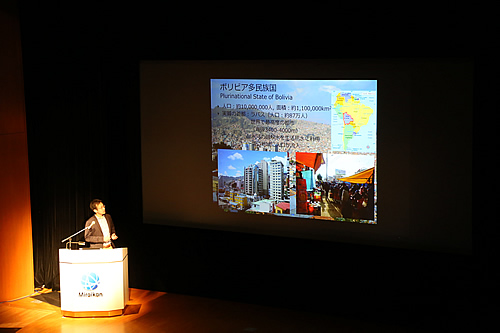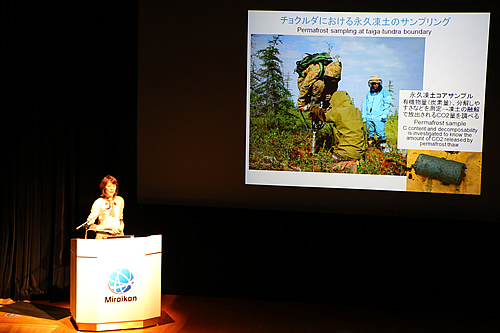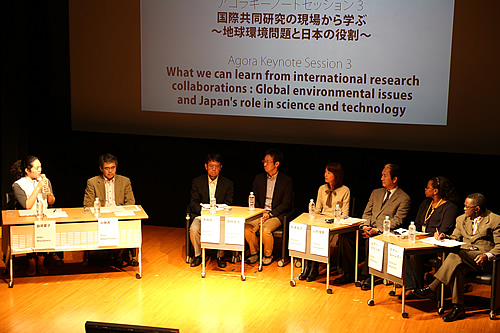地球温暖化による海面上昇や氷河減少、気候変動といった国境を越える地球環境問題を解決するためには、さまざまなアプローチが必要です。アゴラキーノートセッション3では、国際共同研究に取り組んでいる研究者から、プロジェクトの成果や、そこから得られた教訓などについて聞くと同時に、国際社会の中で日本がどのような役割を果たしていくべきなのかについて一緒に考えました。
Various approaches are needed in order to solve cross-border global environmental problems including rising sea levels and the retreat of glaciers caused by global warming, as well as climate change. In Agora Keynote Session 3, we heard from researchers working on international research collaborations about the outcomes and lessons learned from projects. We also discussed the roles Japan should play in the international community.
地球規模で起きている環境問題は、21世紀最大の課題と言えます。特に、温暖化による影響は世界各国で大きな問題となっています。海面上昇によって島国は水没の危機にさらされ、氷河減少によって生態系や気候が大きく乱される可能性があります。ところが、これらの課題は問題が大き過ぎてカバーすべき範囲があまりに広いため、一般的な国民がどのようにアプローチしたらよいか、イメージするのが難しいという問題があります。
Environmental problems occurring on a global scale are the largest issues of the 21st century. In particular, the impacts of global warming are causing major problems in various countries around the world. The rise in sea levels is putting some island nations in great danger of being submerged, and the retreat of glaciers may cause major disturbances to ecosystems and the climate. However, because these issues are so large in scale and scope, members of the public have difficulty envisaging how they can approach them.
開会の挨拶で、東北大学教授の中静透氏は「国際的な共同研究には困難もあります。しかし、プロジェクトの成果やそこから得られた教訓から、みなさんが個人として貢献できることを見つけていただければ幸いです」と述べました。
In the opening address, Toru Nakashizuka, Professor at Tohoku University said that international research collaborations involve difficulties, but it would be very good if individual participants could find things to contribute, by listening to the outputs and lessons learned from the collaboration projects.
国際共同研究プロジェクトの紹介では、地球規模課題対応国際科学技術協力(SATREPS)あるいは戦略的国際科学技術協力推進事業(SICP)に採択された研究者が、研究成果や海外との取り組みについて説明しました。
In the introductions for the international research collaboration projects, the researchers chosen to participate in the Science and Technology Research Partnership for Sustainable Development (SATREPS) or the Strategic International Research Cooperative Program (SICP) explained their research outcomes and international collaborations.
地球システム学、サンゴ礁学を専門とする東京大学教授の茅根創氏は、南太平洋の環礁にあるツバル国において、地球温暖化による海面上昇から島を生態工学的に守る取り組みを進めてきました。高い所でも海抜約1-2メートルのツバルは、海面上昇で水没の危機にあると言われていますが、茅根氏は「実は、土地の不適切な利用や生活雑排水の垂れ流しによる環境悪化など、ローカルな問題もあります」と話します。
Hajime Kayanne, Professor at the University of Tokyo who specializes in earth systems and coral reefs, has been conducting ecological engineering activities to protect Tuvalu (a nation made up of atolls in the South Pacific) from rising sea levels caused by global warming. Even high areas on Tuvalu are only 1-2 meters above sea level on average, and the nation is believed to be at severe risk of being submerged due to rising sea levels. However, Prof. Kayanne explained that they also have local problems such as environmental degradation caused by inappropriate land use and the discharge of untreated miscellaneous household wastewater.
ツバルは、サンゴ礁を土台として、有孔虫の殻(いわゆる「星の砂」)が堆積した島に作られた国です。ところが、近年の人口増加によって居住区が拡大し、ゴミの不法投棄や生活雑排水がそのまま海に流れ出しているため、ツバルの島内や周辺海域の生態系が破壊されています。その結果、有孔虫の生産が減って砂が堆積しにくくなり、海面上昇の影響をより受けやすい状態になっていることが、茅根氏らの研究プロジェクトによって明らかになりました。
Tuvalu islands are made up of shells of foraminifera (so-called “star sand”) accumulating on coral reefs. However, residential areas have expanded due to the population increasing in recent years, and waste is illegally dumped and miscellaneous household wastewater is discharged untreated into the sea. This is destroying ecosystems on the islands of Tuvalu and in the surrounding sea. The research project conducted by Prof. Kayanne and others found that this pollution caused the decline in the production of foraminifera and reduced the accumulation of sand, which has left the islands more likely to suffer from the impacts of rising sea levels.
このため、有孔虫の養殖や突堤の撤去、生活雑排水の浄化などが提案されています。「同じことは、他の島国にも当てはまると考えている。他の地域にも知見を広めていきたい」(茅根氏)。
The recommended countermeasures to the problems include aquaculture for foraminifera, the removal of piers and the purification of miscellaneous household wastewater. Prof. Kayanne said, “It is likely that the same thing applies to other island nations. I would like to share the findings with scientists working in other areas.”
東北大学特任助教の朝岡良浩氏は、ボリビアにおける熱帯氷河が、気候変動によってどのような影響を受け、地域の水源をどのように確保していくべきかについて、現地のサンアンドレアス大学と共同で研究するプロジェクトに参加しています。朝岡氏は「ボリビアでは、氷河の融解水を生活用水に使っています。温暖化で氷河が縮小すれば水資源の枯渇につながる恐れがあります」と説明しました。
Yoshihiro Asaoka, Project Assistant Professor at Tohoku University is taking part in a joint research project with a Bolivian university the Higher University of San Andres (UMSA). The project studies how tropical glaciers in Bolivia are affected by climate change and how to secure water sources in the relevant areas. Dr. Asaoka explained that glacial meltwater is used for daily life in Bolivia and the retreat of the glaciers caused by global warming could lead to the exhaustion of the water source.
氷河の融解量や現地の降水量などを測定するために、モニター機器を設置する必要があるのですが、「当初は機器を破壊されることもあった」(朝岡氏)と言い、「現地の住民には、研究目的が伝わっていませんでした。そこで、政府や市議会に丁寧な説明をするのはもちろんのこと、住民とも積極的に交流するようにしました」と報告しました。今では、水資源の問題は現地の問題でもあるということが理解され、住民がモニター機器を見張るなど、積極的に協力してもらっているとのことです。
In order to measure the amount of glacier melt, precipitation in the areas, etc., monitoring equipment had to be installed. Dr. Asaoka said that initially there were cases where the equipment was destroyed. He also reported that local residents did not know the purpose of the research and that his team started to interact with residents actively in addition to explaining the project to the government and municipal councils in detail. According to Dr. Asaoka, the residents now understand that the water resource problem is relevant to their local communities and cooperate with the project actively by overseeing the monitoring equipment, for example.
朝岡氏は、「国際共同研究は国や文化の壁を超えた取組であり、多様なステークホルダーの参画を得て十分な対策と準備をしたうえで、さらに丁寧に説明するなどの合意形成が大切だ」と述べます。
Dr. Asaoka said that international research collaborations transcend national and cultural barriers, and therefore it is important to build consensus by giving detailed explanations, etc. in addition to taking measures and making preparations comprehensively with the participation of the various stakeholders.

「北極域における温暖化は、より顕著です」と語るのは、北海道大学教授の杉本敦子氏です。ロシア東部、東シベリアの永久凍土には、二酸化炭素より温室効果の高いガスであるメタンが埋蔵されています。温暖化によって永久凍土が溶け、地中に固定されているメタンが放出され、それによってさらに温暖化が進むという悪循環が懸念されています。
Atsuko Sugimoto, Professor at Hokkaido University said that global warming is more notable in the Arctic region. The permafrost in Eastern Siberia in the eastern part of Russia stores methane which is a more powerful greenhouse gas than CO2. There is a concern that global warming may cause a vicious circle where the permafrost melts due to global warming, which releases the methane being stored underground and this accelerates global warming.
杉本教授は、東シベリアの森林などで永久凍土のサンプリングなどを行い、二酸化炭素やメタン、水などの物質循環を調べる研究をしています。「ロシアは先進国ですが、ソ連崩壊以降の社会的変化や科学技術分野の情勢変化が激しいようです」(杉本氏)として、ロシアとの共同研究には独自の難しさがあると言います。
Prof. Sugimoto conducts research into material cycles for CO2, methane, water, etc. by for example sampling permafrost in forests, etc. in Eastern Siberia. According to Prof. Sugimoto, joint research with Russia has its own difficulties. She explained that, although Russia is a developed country, social conditions and the circumstances surrounding science and technology have changed greatly, since the collapse of the Soviet Union.
それでも、調査においては現地の協力が欠かせないとして、自分たちの研究を知ってもらうための活動も行っています。「観測開始記念セレモニーでは現地の住民の儀式を取り入れたり、図書館でタウンミーティングを行ったりしています」(杉本氏)。
Nonetheless, local cooperation is essential for surveys and therefore they conduct activities to let people know about their research. Prof. Sugimoto said that they have incorporated local residents’ rituals into the observation inauguration ceremony and conducted a town meeting in a library.

海洋研究開発機構アプリケーションラボ所長の山形俊男氏は、南インド洋における海水温と、アフリカ南部における降雨との関連を研究してきました。南インド洋において、東部の海水温が低下し、西部の海水温が上昇する現象は発見者の山形氏によって「ダイポール現象」と命名され、エルニーニョ現象と同様に世界の気候に影響を与えることが懸念されています。ダイポール現象による海水の温度差は大気の流れを変え、アフリカ南部の降水量に影響を与えるとされています。山形氏は南アフリカ共和国との共同研究を通じ、ダイポール現象発生のメカニズム解明、さらにアフリカ南部における洪水・干ばつ予測を目指しています。
Toshio Yamagata, Director of the Application Laboratory at the Japan Agency for Marine-Earth Science and Technology (JAMSTEC) has conducted research into the association between the sea temperature in the southern Indian Ocean and rainfall in Southern Africa. Dr. Yamagata and others discovered anomalous sea-surface temperature changes where the eastern part of the southern Indian Ocean becomes cooler and the western part of the ocean becomes warmer. The phenomenon was named the “Indian Ocean Dipole (IOD)” by them. There is a concern that this phenomenon will affect the global climate in a similar way to El Nino. The sea-surface temperature difference of the IOD is believed to alter the atmospheric flow and affect precipitation in Southern Africa. Through joint research with the Republic of South Africa, Dr. Yamagata aims to clarify the mechanism of the IOD occurrence and predict flooding and droughts in Southern Africa.
山形氏は「地球環境問題では、広域で起きていることを予測し、いかにそれぞれの地域にダウンスケールしていけるかがポイントです」と話しました。この研究においても、南インド洋という広域で起きている気候変動を、南アフリカ共和国の降水量という問題に落とし込む(ダウンスケールする)ことで、現地レベルで対策できるようアレンジする試みが進んでおり、山形氏は「洪水や干ばつが予測できれば、事前に災害対策ができます。ゆくゆくは感染症対策など、住民の健康問題にまで踏み込んでいきたい」と語りました。
Dr. Yamagata explained that the important thing in tackling global environmental problems is to predict regional phenomena and to use the information to study phenomena in local areas (“downscaling”). The research conducted with the Republic of South Africa is no exception. They are trying to use the information on the regional climate change occurring in the southern Indian Ocean to tackle a problem concerning precipitation in the Republic of South Africa (downscaling) and to arrange local-level measures. Dr. Yamagata said that pre-disaster control measures can be taken if flooding and droughts can be predicted, and that they want to go further and eventually tackle the residents’ health problems with measures to control infectious diseases, etc.
続くパネルディスカッションでは、発表した4名と、ファシリテーターに日本科学未来館科学コミュニケーターの益原愛子氏、コーディネーターの中静氏が登壇。ゲストに開発途上国における科学振興のための世界科学アカデミー事務局長のロメン・ムレンズィ氏、南アフリカ共和国大使館科学技術省担当公使のユディ・マブーサ氏を迎え、国際共同研究における課題などを議論しました。
The speeches were followed by a panel discussion, where the previous four speakers were joined by Aiko Masuhara, Science Communicator at the National Museum of Emerging Science and Innovation (Miraikan) and Prof. Nakashizuka, who served as the facilitator and the coordinator, respectively. Romain Murenzi, Executive Director of the World Academy of Science (TWAS) and Eudy Mabuza, Minister-Counsellor: Science and Technology at the South African Embassy in Tokyo were invited as guests. The participants discussed the challenges concerning international research collaborations and other topics.

国際共同研究では、「現地との交流が不可欠である」「相手の文化を理解するべき」という一致した見解示されました。特に途上国との国際共同研究では、「援助するという意識ではなく、パートナーとして接する心構えが必要である」と山形氏が経験を踏まえて語りました。マブーサ氏も「時間はかかるが、お互いに信頼を構築していくことが大切だ。諸外国が日本の科学技術と協力することは、素晴らしい連携だ」と述べました。
With regard to international research collaborations, all the participants expressed the views that interaction with local communities is essential and that researchers should understand their partners’ cultures. In international research collaborations with developing countries in particular, Dr. Yamagata said based on his experience that researchers need to have an attitude of treating their counterparts as partners rather than giving them assistance. Ms. Mabuza said that it is important to build mutual trust although it may take time, and that it is wonderful for various countries to collaborate with Japan on science and technology.
共同研究で得られた知見は、単に途上国の問題にとどまらず、日本における課題を浮かび上がらせました。
茅根氏は「ツバルでは、居住区の拡大が浸水被害の一因であることがわかったが、同じことは東日本大震災やたびたび起きる豪雨災害などにも当てはまる。かつて河川の氾濫原や扇状地だった場所に市街地や住宅地を作ってしまったことが、被害を拡大させています」と語り、自然の力を利用して災害を乗り越える技術である、Eco System Based Adaptationを日本も学んでいく必要性を示唆しました。
The findings of the joint research presented in the session highlighted issues that Japan has in addition to the problems in developing countries.
Prof. Kayanne suggested the need for Japan to learn about ecosystem-based adaptation which refers to techniques for adapting to increasing disasters using the abilities of nature, by explaining, “In Tuvalu, we found that the expansion of residential areas is one cause for inundation damage. The same thing applies to what happened in the Great East Japan Earthquake and the frequent damage from torrential rain. Urban districts and residential districts have been developed on what were once river floodplains and alluvial fans, and this has expanded the damage.”
また、次世代の育成にも話は及びました。国際共同研究においても、「若手を育成することが必要で、学生のころから途上国に行ってもらいたい」という意見が出ました。ムレンズィ氏は「自分の国だけにいると、世界で起きていることを見逃してしまいます。海外に行って、多様性があることを肌で感じてほしい」と、若者に呼びかけました。
The discussion extended to the issue of training the next generation. There was the opinion that, in the area of international research collaboration, training young people is necessary and more students should visit developing countries. Dr. Murenzi said to the young people in audience that they may overlook what is happening in the world if they only stay in their own countries and that he wants young people to go overseas and experience the diversity first-hand.
下記のリンクからご覧ください。